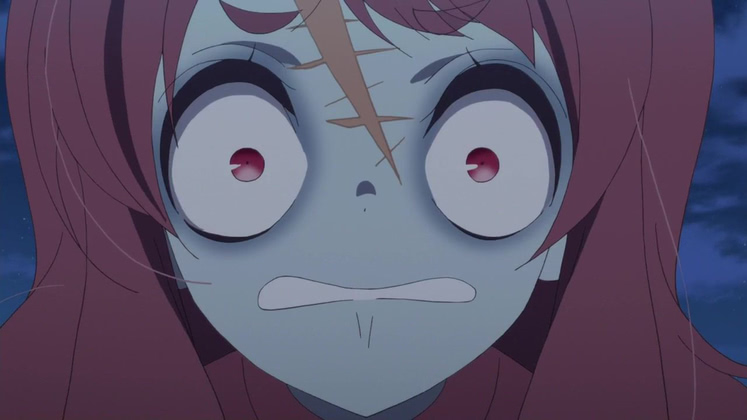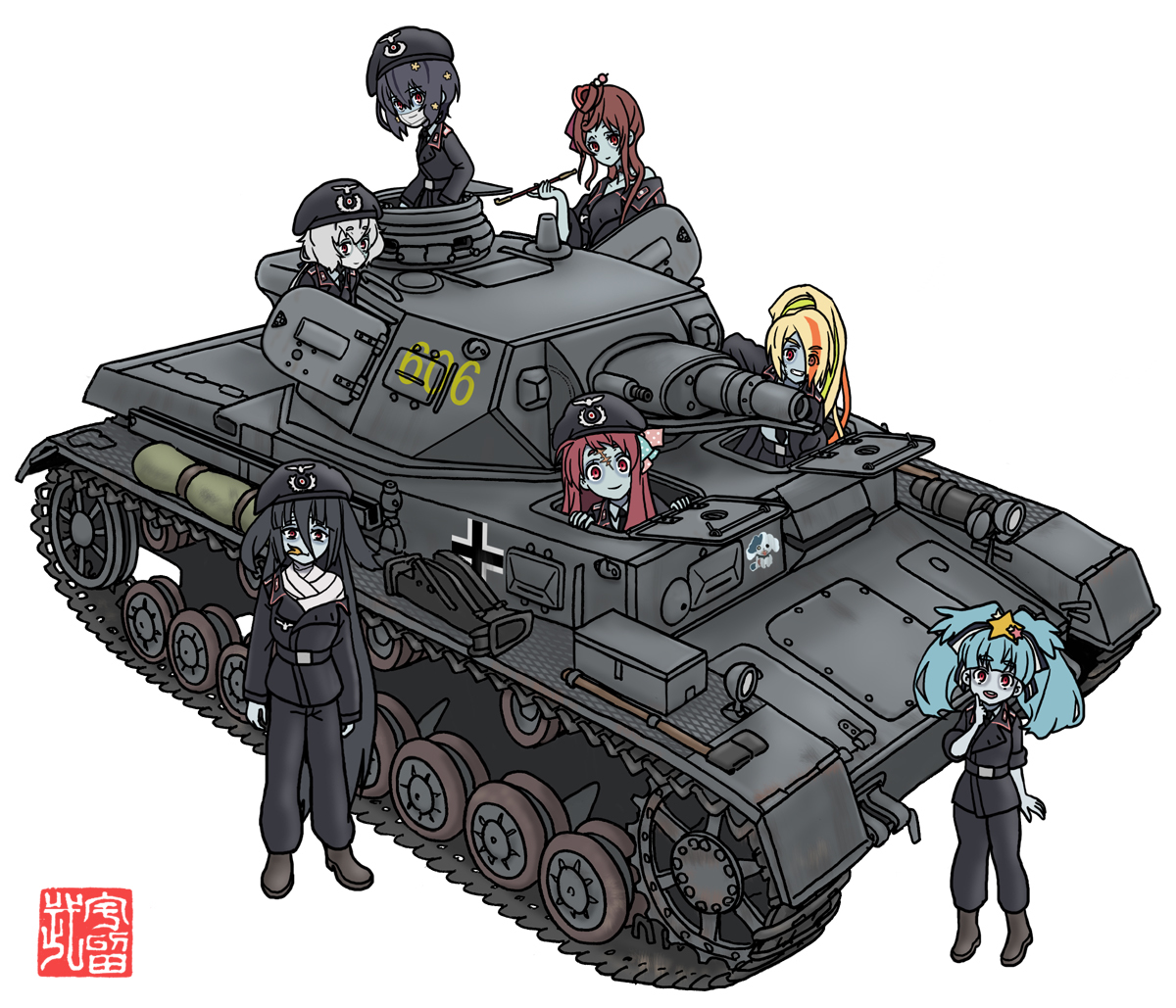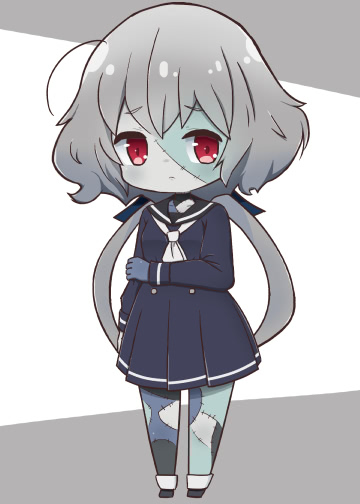Anime
Stop! Drama time!
Despite setting up and then cheerfully ignoring Chekhov’s Warning Sign, this week’s angsty teen zombie drama reveals that Our Heroine is trope-ariffic.
They also drop some more clues about Our ZombieMaster, but do not go so far as The Big Reveal. Instead, we’re in that crucial moment of the classic underdog sports story, where the hero has lost confidence the night before the big game.
Will Vaughn pitch the strikeout that the Indians need to win the pennant? Tune in next week, for Idol League (no relation; also no relation).
Zombie Twist!
While it’s kind of sad that a cheesy zombie idol anime is ten times more fun to watch than Doctor Who, it’s even sadder that it’s got more of a plot.
…which thickens in this episode, with a slap and a bang. Will they play it straight next episode, or go for the mind-fuck? Excuse me, braaiiiiins-fuck.
In other news, as the ratings for DW continue to drop, the rumor mill has Chibnall and Whittaker both leaving, either after one more season or as soon as the New Years special airs. The other rumors have the BBC just killing the show off completely. Either way, they’ll blame fans for being cisracistsexisthatinggarbage, which their shills are already doing in between bouts of ratings denial.
Zombies and Panzers...
With three episodes left to go, I have a feeling they’re not going to explain the madness, just keep running with it.
(via)
DanMachi spoiler...
As I mentioned a while back, the mobile game for the Is it wrong to try to pick up girls in a dungeon? franchise is chock full of story, much of it written by the original novelist, so it’s arguably canon. I wasn’t particularly impressed with the recent Attack on Titan crossover, but the current Christmas story includes a very interesting internal monologue that provides information on the popular mystery, WTF is Syr, really?.
Frantically chasing after a kidnapped little girl, Syr thinks to herself:

"I felt a great disturbance in the Pixiv..."
“…as if dozens of fan-artists were feeling trolled AF after the latest episode of Zombieland Saga…”
“…and dozens more found new inspiration…”
This is her shocked face. Not to be confused with Sarah Hoyt’s.

Dear Zombieland Saga...
Of the many sketchy things about the group’s producer, the fact that he does their makeup is the one that gets me.
Their full-body makeup. Including inner thighs.
Note: Junko seems to be the runaway favorite for fan-art. I still haven’t picked a favorite.
Audio dramas with a side of gaming
One of the things that’s always been difficult for non-Japanese anime viewers is the amount of extra untranslated content that develops the characters and cleans up the stories. The mobile game for the “Is it wrong to try to pick up girls in a dungeon?” franchise is only moderately interesting as a game, but is absolutely stuffed with story, with music, art, and voice work by the anime staff and actors, and side stories co-written by the original author, making it all canon.
The only downside is that the game mechanics are optimized for deep-pockets “whale” players, and it gets increasingly grindy for free players after a while. You get enough “stamina” credits to play for free for quite a while each day, but unless you get some lucky gacha draws, you’ll eventually stop progressing through the quests, and be forced to spend your time grinding for materials and cash to upgrade your sub-optimal party members and/or replace them with better ones.
Fortunately, by then you’ll have unlocked a number of side stories that flesh out characters who are barely touched on in the anime, some of which are quite lengthy. (seriously; the catgirl waitresses just got a sequel to their previous adventure)
Performance-wise, the game is a real space-hog (3+ GB without the optional extra voice content; make sure you’re on wifi when you run it the first time) and battery drain, and will not run well on older devices with limited memory. For instance, on my iPhone 6+, it’s too big to stay suspended in memory if I switch to any other app, it takes quite a while to load, and it drains the battery very quickly, so I play on my iPad Mini 4 instead. (you can transfer a game between machines using a code/password combo)
It’s fully translated, and most of the Japanese voice content is subtitled (except for combat taunts, etc). The chibi versions of the characters are adorable and well-animated. Many of the side stories are a lot of fun. The main questlines cover both anime seasons and all three novel series, and given the kind of money they must be pulling in, I expect they’ll keep adding more.
The casino “poker” game unlocked at the end of the Ryu questline is really just a slot machine that’s almost impossible to lose money at, but it provides another way to grind for upgrades when you’re bored with the usual ones.
There are a lot of things not made clear in the documentation, and I was kind of surprised that none of the FAQs really cover it well, either. For instance, I was running around with a gimped party for quite a while because I didn’t realize that assistants add all their stats to the character they’re paired with, making it important to level them up just as much as the adventurers, and to pay as much attention to the distribution of their stats as to the buffs they provide.
Also, “White Healer” Amid was my single best gacha pull. I wouldn’t have made nearly as much progress without her in my party, and I’d almost pay to limit-break her right now.
I did make a single in-game purchase (“Syr’s Daily Lunch Box”, which provides resources for 30 days) to reward the company for amusing me, but everything else costs about 10x what I’d be willing to pay, and even paying real money doesn’t let you pull specific characters.
Questions no one was asking...
“Are your platelets cute enough?”
NSFW, because fan artists who spot a loli are on her like white on rice.


